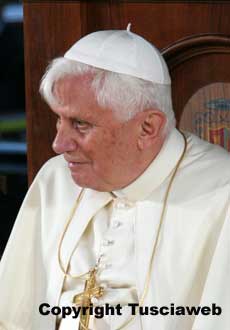 |
| Papa Benedetto XIV |
|
|
|
Riceviamo e pubblichiamo - L’ambasciatore del Regno del Belgio, dietro istruzioni del ministro degli Affari Esteri, ha comunicato al segretario per i rapporti con gli Stati della risoluzione con cui la Camera dei rappresentanti del proprio Paese ha chiesto al governo belga di "condannare le dichiarazioni inaccettabili del Papa in occasione del suo viaggio in Africa e di protestare ufficialmente presso la Santa Sede". L’incontro si è svolto il 15 aprile.
La segretaria di Stato prende atto con rammarico di tale passo, inconsueto nelle relazioni diplomatiche tra la Santa Sede e il Regno del Belgio.
Deplora che una assemblea parlamentare abbia creduto opportuno di criticare il Santo Padre, sulla base di un estratto d’intervista troncato e isolato dal contesto, che è stato usato da alcuni gruppi con un chiaro intento intimidatorio, quasi a dissuadere il Papa dall’esprimersi in merito ad alcuni temi, la cui rilevanza morale è ovvia, e di insegnare la dottrina della Chiesa.
Come si sa, il Santo Padre, rispondendo ad una domanda circa l’efficacia e il carattere realista delle posizioni della Chiesa in materia di lotta all’AIDS, ha dichiarato che la soluzione è da ricercare in due direzioni: da una parte nell’umanizzazione della sessualità e, dall’altra, in una autentica amicizia e disponibilità nei confronti delle persone sofferenti, sottolineando anche l’impegno della Chiesa in ambedue gli ambiti. Senza tale dimensione morale ed educativa la battaglia contro l’Aids non sarà vinta.
Mentre, in alcuni paesi d’Europa, si scatenava una campagna mediatica senza precedenti sul valore preponderante, per non dire esclusivo, del profilattico nella lotta contro l’Aids, è confortante costatare che le considerazioni di ordine morale sviluppate dal Santo Padre sono state capite e apprezzate, in particolare dagli africani e dai veri amici dell’Africa, nonché da alcuni membri della comunità scientifica.
Come si può leggere in una recente dichiarazione della conferenza episcopale regionale dell’Africa dell’Ovest (Cerao): "Siamo grati per il messaggio di speranza che [il Santo Padre] è venuto ad affidarci in Camerun e in Angola. E’ venuto ad incoraggiarci a vivere uniti, riconciliati nella giustizia e la pace, affinché la Chiesa in Africa sia lei stessa una fiamma ardente di speranza per la vita di tutto il continente.
E lo ringraziamo per aver riproposto a tutti, con sfumatura, chiarezza e acume, l’insegnamento comune della Chiesa in materia di pastorale dei malati di AIDS".
Segreteria di Stato vaticana
Il testo della nota vaticana in lingua inglese
The Ambassador of the Kingdom of Belgium, acting under instructions from the Minister of Foreign Affairs, has informed the Secretary for Relations with States of the Resolution with which the House of Representatives in his country asked the Belgian Government to "condemn the unacceptable statements of the Pope on the occasion of his journey to Africa and to protest officially to the Holy See". The meeting took place on 15 April 2009.
The Secretariat of State notes with regret this action, unusual in the context of the diplomatic relations existing between the Holy See and the Kingdom of Belgium. It deplores the fact that a Parliamentary Assembly should have thought it appropriate to criticize the Holy Father on the basis of an isolated extract from an interview, separated from its context, and used by some groups with a clear intent to intimidate, as if to dissuade the Pope from expressing himself on certain themes of obvious moral relevance and from teaching the Church’s doctrine.
As is well known, the Holy Father, in answer to a question concerning the efficacy and the realistic character of the Church’s positions on combating Aids, stated that the solution is to be sought in two directions: on the one hand through bringing out the human dimension of sexuality; and on the other, through true friendship and willingness to help persons who are suffering. He also emphasized the commitment of the Church in both these areas. Without this moral and educational dimension, the battle against Aids will not be won.
While in some European countries an unprecedented media campaign was unleashed concerning the predominant, not to say exclusive, value of prophylactics in the fight against Aids, it is consoling to note that the moral considerations articulated by the Holy Father were understood and appreciated, in particular by the Africans and the true friends of Africa, as well as by some members of the scientific community. As one can read in a recent statement of the Regional Episcopal Conference of West Africa (CERAO): "We are grateful for the message of hope which [the Holy Father] came to entrust to us in Cameroon and Angola. He came to encourage us to live in unity, reconciled with one another in justice and peace, so that the Church in Africa can herself be a burning flame of hope for the life of the entire continent. And we thank him for having restated for all, in a nuanced, clear and insightful way, the common teaching of the Church concerning the pastoral care of sufferers from Aids."



